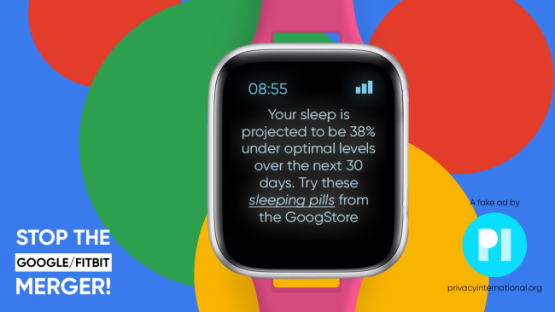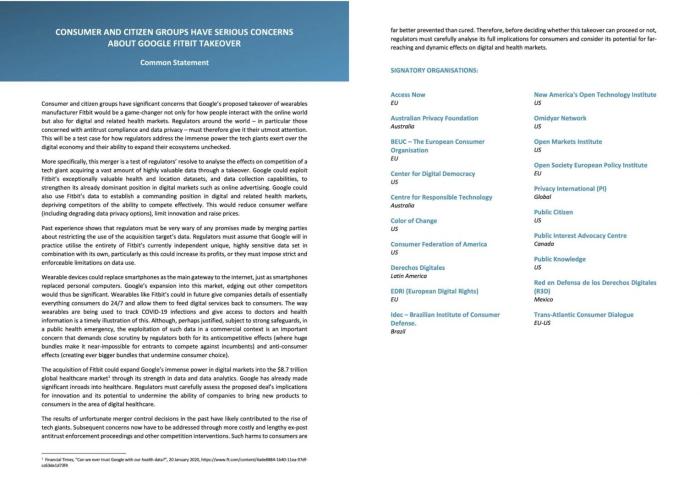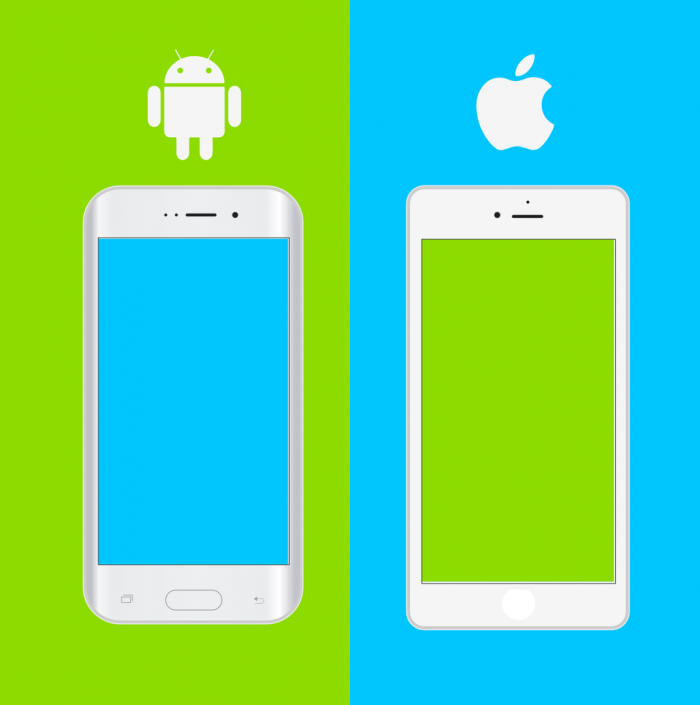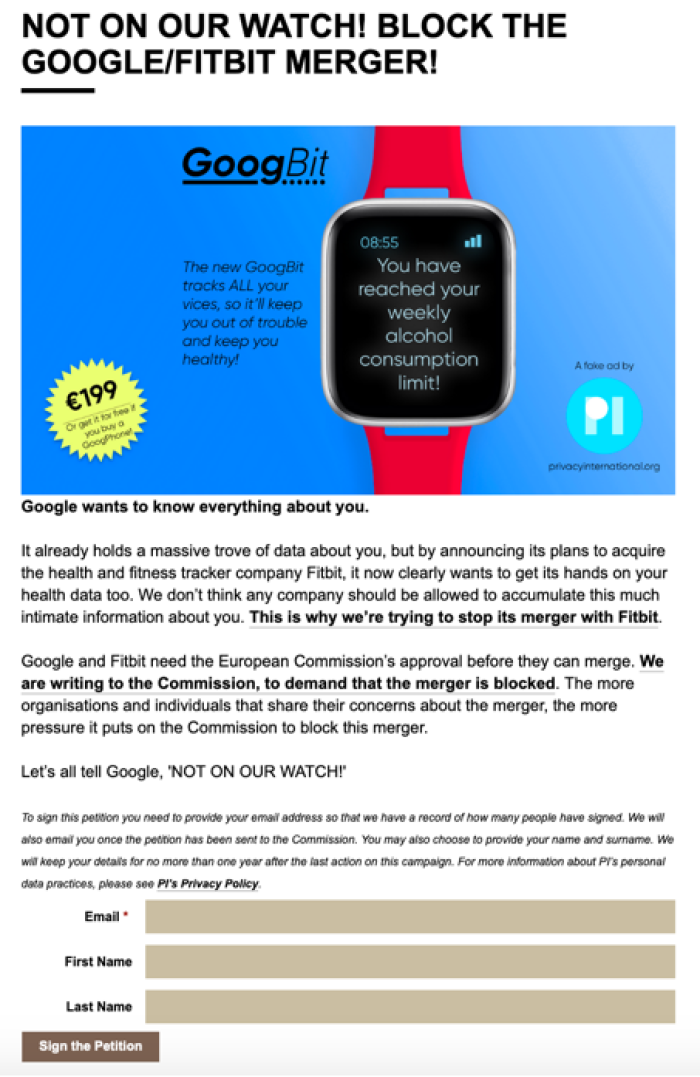
The impact of our public campaign against the proposed Google/Fitbit merger
During summer 2020, over 2,500 people signed PI's public petition opposing the proposed Google/Fitbit merger. We sent the petition to the European Commission, who are yet to decide if the merger can proceed. The Commission responded by thanking petitioners for their concerns and cooperation, just as they opened a detailed phase 2 investigation into the merger.
The impact that we are ultimately seeking is for our public campaign to give the European Commission an insight into public concerns about the Google/Fitbit merger, and to block the merger accordingly. At the time of writing, that decision is still three months away.
In the meantime, this campaign has nonetheless had a wider impact, in educating, informing and inspiring the public about why big tech mergers matter to their daily lives.

An edited version of this article was originally published on the EDRi website in September 2020.
Introduction
Monopolies, mergers and acquisitions, anti-trust laws. These may seem like tangential or irrelevant issues for privacy and digital rights organisations. But having run our first public petition opposing a big tech merger, we wanted to set out why we think this is an important frontier for people's rights across Europe and indeed across the world.
In June, Google notified the European Commission of its intention to acquire Fitbit, the health and fitness tracker company. Google’s stated mission is to "organize the world's information and make it universally accessible and useful.” ‘Organize’ sounds so benign, just administrative, so tidy. But Google isn’t Monica from Friends. Google can only organise the world’s information by first aggressively getting its hands on the world’s information, whether we really want to give them that information or not. And nothing is more personal than our health data so this would be a game-changing acquisition. Because of how Google could potentially combine our health data with so much other data it already has about us, we were concerned that Google would use the merger to become an unassailable leader in the health and fitness monitoring market.
The merger triggered reactions among civil society organisations, and PI was a signatory to a common statement sent to the European Commission, coordinated by BEUC, the European Consumer Organisation. We really valued this endeavour and we will always see advocacy as an important route to achieving our charitable aims. But we also wanted to inform and inspire the public, and take them with us.
Getting the public to care
But can we get the public to care about a boring merger? That’s the €1.86bn question (that’s how much Google wants to pay for Fitbit). When big tech companies make strides forward in their capabilities and reach, often by buying up existing companies in markets that they don’t yet dominate, it affects everyone’s rights.
Mergers and acquisitions, undertaken with the kind of aggression and greed that we see amongst big tech companies, can mean they are the ‘last man standing’ in their markets. With less competition, the bloated big tech companies can impose unfair conditions on users, and they can also afford to be complacent about our privacy.
Crushing or buying competitors also boosts 'network effects’ - a simple example of a network effect is that you probably started using WhatsApp because well, everybody else was on WhatsApp, so you couldn't really not be on WhatsApp. That particular network effect means you’re using yet another Mark Zuckerberg service, whether you like it (or him) or not.
But back to the Google/Fitbit merger. If you want to get away from Google’s tentacles, theoretically at least, you can be a digital ascetic and live a life without Google search, Google Maps and YouTube. And you'd have to give up your Android phone too (80% of the world’s smart phones use Google’s Android operating system, so statistically speaking you probably own one). But bear in mind, if you do get rid of it to get one over on Google, it would probably just mean buying a phone from that other big tech behemoth instead. So in the real world, consumers have no choice but to go with the flow, and feed the tech beasts’ insatiable appetites. In doing so, we find ourselves unknowingly further entrenching the power of the big tech companies.
United we stand
So, we launched a public petition against the Google/Fitbit merger within a couple of days of it being announced to the European Commission. With the support of eight CSOs around the world [Access Now, ARTICLE 19, Derechos Digitales, EDRi, Hellenic Association of Data Protection and Privacy, Homo Digitalis, Idec (Brazilian Institute of Consumer Defense) and Unwanted Witness], we coordinated a social media campaign to warn about 'Googbit', a fictional dystopian smart watch. Googbit would link together your health data with a range of other Google products and services e.g. ‘You have been depressed for a month. Buy this book from the GoogStore because I think it will lift your mood’ etc. It’s a bit like the operating system in the film ‘Her’, but without the romantic entanglement.
Over 2,500 people signed the petition over a few short weeks, which we then sent on to Margrethe Vestager, the Executive Vice President of the European Commission for A Europe Fit for the Digital Age. We were heartened that Commissioner Vestager sent a letter to thank PI and the petitioners, noting that she appreciated the views the public expressed through our petition.
What's next?
The Commission, having already decided to undertake a detailed phase 2 investigation of the merger, now have until beginning 2021 to announce their final decision. We’re confident that whatever the Commission rules, they will now be taking into account the concerns of the people who signed our petition. And while we hope that the Commission will make the right decision (and uphold consumer well-being over big tech profit), whatever they decide we have at least started to inform, educate and inspire the public about why boring tech mergers do matter to their lives.









